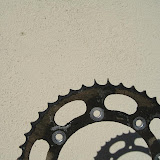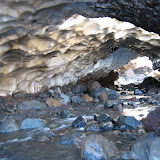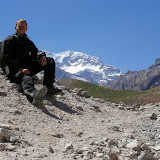Ushuaia, Island of Tierra del Fuego, Argentina
Latitude: 54.8 degrees south
Trip Odometer: 20,041 miles
Day: 231
It was a troublesome day for line-makers in Vegas. At about the same time that Winthrop was serving a set of walking papers to Notre Dame in the NCAA men´s basketball tournament, a $2000 Japanese motorcycle held together by a lot of pink duct tape and a kaleidoscope of fluorescent zip ties was sputtering to the to the end point of Ruta 3 in southern Argentina, thereby reaching the literal end of the road through the Americas. After over 20,000 miles, eight months, and fourteen countries, the driver finished the final 20 miles the best way he knew how: with a less-than-slender Irishman from Belfast on the back of his bike.
Shortly after the last update, Lady Fortune smiled upon me and a new way of attaching the theretofore incompatible front sprocket to the motorcycle was revealed. More than slightly eager to get the hell out of Rio Gallegos, I attempted to make my way towards the island of Tierra del Fuego to the south by way of El Cabo de las Virgenes, the second-largest penguin colony in Latin America.
The road in that direction was a dirt job blazed by Chevron-Texaco as a means to get to the rich oil and natural gas fields lurking near to and off of the Atlantic coast. A few days of sporadic rains had turned parts of it into the equivalent of one of those giant pools of ice cream that kids had to slide into on the zany Nickolodeon show, ¨Double Dare¨. Traction-wise. The road sadly was not edible.
It took about three times as long as I thought it would to traverse approximately 100 miles, but through the light fog along the beach I could hear the odd mutterings of a whole lot of penguins; I had been able to smell them since a ways back. 20,000 of the little pudges were molting in the reserve, doing their best to shake off the old feathers for new, insulated ones that would allow them to head back out to the ocean without freezing to death. Most people visit the area when the chicks are starting to hatch or simply in finer weather, but all of that was fine by me. There´s something very unusual indeed about being completely alone on a beach with thousands of penguins waddling around to keep on eye on you keeping an eye on them.
The penguins choose this particular stretch of land to come to breed and molt because of a scrubby type of brush called the ¨mate verde¨. The soil being loose and unaccommodating, it seemed to be about the only type of flora able to hang up its hat there. All of the male penguins come in every year, take a look around the place, scope out a choice parcel of land with a mate verde plant growing on it, and then dig out a little enclave in the sandy soil at its base. There they set up shop and lounge, safe from the eyes of the birds of prey circling above. ¨Bring on the ladies¨, they say.
The female penguins strut up in short order and do a little Parade of Homes as the males show off their digs and ask, ¨You like?¨ If the female does indeed fancy the place, she lets herself in, a woman´s touch is applied to the nest, and in short order the stork arrives with a little bundle of penguin egg joy and the occasional jar of Clausen pickles...or at least that´s what we´ll tell the kids.
The slippery roads and extended travel time bought me another night in Rio Gallegos since I couldn´t make the border in time. This night brought a middle-aged Argentine furniture salesman and a young Israeli man to the shared hotel room. Though I wear earplugs at night, they didn´t keep me from being woken up to incomprehensible shouts in Hebrew from the Israeli, who apparently doesn´t just talk in his sleep but screams. I was comforted in the morning to find that his mysterious incantations had not morphed me into a piglet or a candlestick.
At last I crossed the border into Chile and took a ferry across the Straits of Magellan, named for that savvy swashbuckler who is falsely believed to have been the first man to sail completely around the world. Alas, old Ferdinand was laid low by a bad mama jama named Lapu Lapu in what are now known as the Phillipines when the overzealous Portuguese spread one dab too many of evangelism onto the natives´ bread. Out came the spears and down went Magellan. Most of his crew made it back, though.
Anyway...
The Strait of Magellan separates the mainland of South America from the largest island in South America, Tierra del Fuego, or ¨Land of Fire¨. It is so named because of all the torches and campfires Magellan and his crew saw along the coast when they first sailed into the strait. Why the natives were living in this remote and fairly inhospitable part of the globe back then is another question. Lacking furs or other sources of clothing, they would slather sea lion fat onto their bodies to keep warm in the extreme cold (and to lock in the stench). Equally as surprising, they rigged up a way to keep a fire going in their boats for warmth while fishing. There boats were made of bark and the water was freezing cold. Something in that smell lightly of a gamble to you, too? Talk about a will to survive.
Thanks to the fact that Chile and Argentina have hashed out a very odd set of borders on the island (do a Google Image search for a map of Tierra del Fuego), you have no choice but to go through Chile to get to the southern tip of Argentina. That meant two border crossings in one day. Even though they´re a world apart from the other countries in South America in terms of modernity, don´t think they don´t have stacks of superfluous paperwork, a series of stampers swimming in red ink, and a couple of sets of dilatory, uninterested hands at the ready to make your transit as painfully slow and inefficient as possible. The icing on the cake of the whole process was watching an Argentine officer that could have been helping with the long lines instead seated on a wheeled office chair with his legs up using a knotted rag to play tug-of-war with a dog that was effectively pulling him around inside the border station.
Cold, soaked from the rain, and not excited about driving much more in the dark of these shortened days, I arrived at the city of Rio Grande. There I stayed at a place called the Hostel Argentino, a place recommended to me by several other motorcyclists. The tradition of the owner, a gracious middle-aged woman with a limp named Graciela, is to give each newcomer a shot of some odd homemade liquor. She gave me two shots because she said I drank the first one too fast (solid logic), and for about an hour I had trouble focusing on colors. No idea what it was. Maybe paint thinner.
From there it was a day´s drive over the final mountain pass and into the city of Ushuaia, which contentiously claims to be ¨the southernmost city in the world¨. Chile also claims to have the southernmost city in the world at Puerto Williams, but it is mostly a naval base and there is no road going to the island. Still, because of their heated rivalry in all things, it must irritate the Chileans to no end that the Argentines beat them to the marketing punch.
Here I have remained for about a week, just taking it easy and taking in the sights. The horizon over the ocean(s) to the south is endless. Only a few small islands stand in the way of a long, cold swim to the Frozen Continent. Well, a few islands and the occassional cruise ship. Walking around town looking through the windows of some of the shops, I can´t help but wonder who in the name of Cat Stevens would buy that gawdy two-foot tall quartz carving of a pair of toucans. Then I see the elderly couple with the Princess Cruise Lines nametags and freshly purchased ¨Ushuaia: The End of the World¨ baseball caps on their heads. Oh, yeah. They would.
Among the best things to do in Ushuaia is to take a boat ride into the Beagle Channel. A number of modern catamarans hustle out every day with about 125 people on board to wind among the islands off the coast and to check out the cormorans and sea lions that live together on the rocks. Instead, I booked passage on what was arguably the ugliest, most rickety vessel in the harbour - a six-man sailboat called the Paludine. Once aboard, I learned from the 28 year-old captain (when he wasn´t holding a cigarette or glass of brew up to his mouth) that he had bought the boat for a song.
About twenty years back, a retired engineer from the French navy decided to build himself a boat. He designed the 30-foot Paludine. Apparently over-engineered, it weighed ten tons when it should have weighed four. The Frenchman then sailed the ship around the world two times by himself, eventually landing in Ushuaia. There he encountered a horrible storm off the coast, dropped anchor, and hid below while his boat was beaten savagely against the rocks. Lacking fresh water, he scurried onto the coast to find a little river or something. It was around that time that he noticed a sign saying, ¨Warning: Mine Field¨. Terrified to move a muscle, he stood fast on a rock for two days straight until a Chilean naval patrol boat spotted him. The mine field sign was only a joke, they said, to keep the Argentines out. More than a little shaken, he headed into town, talked to the then much younger captain, and told him that he had had enough and wanted to sell the boat. The Frenchman wanted sixty thousand. The captain said he had ten - maybe thirteen. The Frenchman said ¨fine¨, and the captain, surprised that the Frenchman would agree to his paltry sum (and actually having no money), convinced his dad to sell his car and pretty much everything else they had to buy the boat. Oh, and one more thing: the Frenchman had done all of this when he was 73 years old.
All in all, Ushuaia has been a little anti-climactic. The closer and closer that I got, the less and less I actually cared if I got here. First of all, I never thought this bike would have made it. And secondly, it feels like somwhat of a hollow and false finality to what has been a great trip. As Robert Louis Stevenson once said, ¨To travel hopefully is a better thing than to arrive.¨ Or, at the risk of sounding very cheesy indeed, better put in the Cavafy poem which I have attached at the bottom of this E-mail for those who aren´t laughing already.
From here it is a decent distance northwest to Torres del Paine National Park, the crown jewel of the hiking circuit in Patagonia for a week-long trek. And then begins the long final approach to Buenos Aires along the Atlantic Coast to sell El Jugoso. It will be a bittersweet parting to hand over the keys, but at this point I don´t care if it gives up its spirit tomorrow. For $2000, it has definitely done its job.
- Tom
ITHAKA
As you set out for Ithaka
hope your road is a long one,
full of adventure, full of discovery.
Laistrygonians, Cyclops,
angry Poseidon - don't be afraid of them:
you'll never find things like that one on your way
as long as you keep your thoughts raised high,
as long as a rare excitement
stirs your spirit and your body.
Laistrygonians, Cyclops,
wild Poseidon - you won't encounter them
unless you bring them along inside your soul,
unless your soul sets them up in front of you.
Hope your road is a long one.
May there be many summer mornings when,
with what pleasure, what joy,
you enter harbours you're seeing for the first time;
may you stop at Phoenician trading stations
to buy fine things,
mother of pearl and coral, amber and ebony,
sensual perfumes of every kind -
as many sensual perfumes as you can;
and may you visit many Egyptian cities
to learn and go on learning from their scholars.
Keep Ithaka always in your mind.
Arriving there is what you're destined for.
But don't hurry the journey at all.
Better if it lasts for years,
so you're old by the time you reach the island,
wealthy with all you've gained on the way,
not expecting Ithaka to make you rich.
Ithaka gave you the marvellous journey.
Without her you wouldn't have set out.
She has nothing left to give you now.
And if you find her poor, Ithaka won't have fooled you.
Wise as you will have become, so full of experience,
you'll have understood by then what these Ithakas mean
Constantine P. Cavafy
 |
| Manifest - 3-17-07 |

